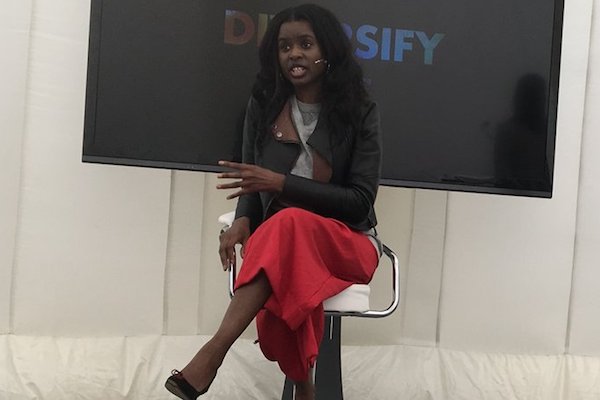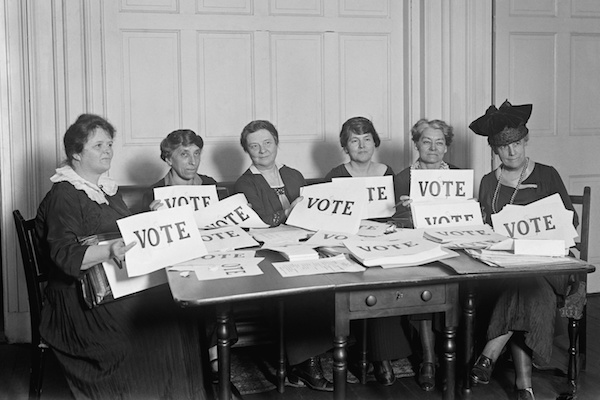

Liam Scholey has shared his views with Express before, and after a recent talk on diversity as part of the Guernsey Literary Festival, the 23-year-old graduate felt compelled to put pen to paper again...
On Saturday I attended a talk by June Sarpong in The Guernsey Literary Festival balloon tent. It was an inspiring talk about the benefits to society of diversity, be that diversity in race, sexuality, gender or class. Diversity can have huge benefits both societally and economically, as well as being the right thing to do. I was particularly inspired to write about gender (in)equality in Guernsey. It might seem strange that a man is writing about this but I consider myself a feminist and an ally to the movement and it is something I would like to contribute to however I can. And I’ve been told I can write ok (not just by myself).

Pictured: June Sarpong speaking at the Guernsey Literary Festival
Of the 40 members of the States of Guernsey, 27 are male. This amounts to 68%. It can be helpful to invert this statistic to say just 32% of deputies are female. In the UK the figure is the same. In Guernsey, the population split is 50.4% female and 49.6% female. For the states to be truly representative of the general population, the number of male and female deputies should be roughly equal.
Of course, this issue is not restricted to our island. Almost everywhere in the world suffers from the same inequity to some extent, although according to the Inter Parliamentary Union there are a small number of countries (Rwanda – 61%, Cuba – 53% and Bolivia - 53%) where women actually hold the balance of power.
This leads us to the question of why this is the case. If the population is roughly split 50/50, all other things being equal, you would expect that any parliament representative of the population would also be split 50/50. Of course, it would be unreasonable to expect that an exact 50/50 split would happen all that often due to some natural variation, but for one gender to be consistently outnumbered 7 to 3 in the chamber would be unthinkable.
So, all other things are not equal. Our society (and society in general) has structural issues which lead to men being favoured for positions of power over women not only in Government but also in business.
There are myriad factors which contribute to this overarching issue, and they go back hundreds of years. We are a product of our history, a fact we cannot escape. It was not until 1918 that women were given the right to vote (if they were older than 30) and to stand for election (if aged 21) and not until 1928 that they were allowed to vote on the same terms as men. That is only 90 years and just a few generations ago.
Legislation is a fantastic way to initiate a change in attitudes towards any given issue. In the early 1900s lots of legislation passed that gave women more rights in a great number of areas including divorce law, child custody, and the ability to train as a lawyer, become a magistrate and sit on a jury.
The right to vote and stand for election finally gave women a political voice, thus encouraging parliamentarians to consider women’s rights issues because women were now in a position of power and could influence elections and be elected themselves.
This was great progress (go us!) but the right to vote for women has only existed in full for 90 years. Many women’s rights issues did not progress until much later; in 1968, the right to abortion under certain circumstances came into law; in 1970, the equal pay act prohibited any less favourable treatment between men and women in terms of pay and conditions of employment; in 1975, the sex discrimination act made it illegal to discriminate against women in work, training or education.

We are not far removed from these law changes and many biases against women still exist. We like to look back and congratulate ourselves for giving women equal rights by law, but in practice men still dominate positions of power throughout the world and clearly the work is not finished.
In the west the issues now are more (but not completely restricted to – see the repeal the 8th campaign in Ireland) attitude based. What we might consider leadership qualities in men – toughness, decisiveness, passion, persuasiveness – are considered unladylike and, quite often, ‘bossy’ in women. Positive character traits for men are considered negative for women.
Studies have shown that women perform worse on maths and science tests when the fact that they are women is at the primed in their minds. An example of this would be a requirement to fill out their name on the paper, or more obviously having to indicate their gender. The perception from society that women aren’t as well equipped in the sciences has a direct influence on women’s performance in science tests – making her perform worse than if she took test where the fact that she is a woman isn’t a factor in her mind.
The biases of society have a direct influence on women’s performances. With fewer women in elected positions of power, or positions of power in business (there are more Dave’s than women CEOs in the FTSE 100), the more society reflects attitudes like ‘men are better leaders’, ‘women just want babies’ and ‘this is a man’s work’.
We need to inverse this trend, to get more women into government and to give our society a wake-up call. Without women in power we are missing out on vital diversity of opinion, and, in business, companies are missing out on profits – those with more women on the board generally are more successful than those without.
The benefits to our society of real gender equality are massive, and what better place to start than right here. We are a small community and we can make this happen and ensuring our States in truly representative is a great place to begin. It may take radical steps – all women shortlists for certain seats for example – but sometimes society needs to be shaken up a bit so we can see how positive making a change can be, as shown by the law changes in the early 1900s.
Labour recently introduced all women shortlists in the UK and we have some great MPs because of that.
Let’s be bold, ensure our States is truly representative and show that diversity is great for everyone and improve our quality of life, our economy, and our future.
The article above was written by Liam Scholey and represents only his views
Comments
Comments on this story express the views of the commentator only, not Bailiwick Publishing. We are unable to guarantee the accuracy of any of those comments.